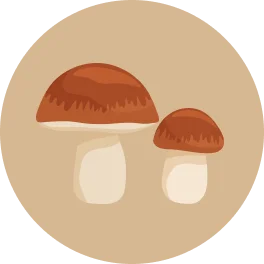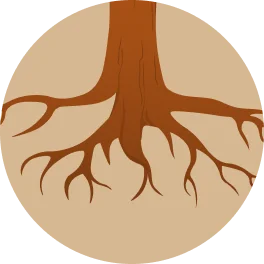Earthworms

This page contains images of animals.
Earthworms consume fallen leaves and earth, creating soft soil that is nutrient-rich. They play an essential role in supporting plant growth and are indispensable to the forest ecosystem.
Master Soil Builders
Naturalist Charles Darwin spent over 40 years studying earthworms, with his final book dedicated to them. His remarkable conclusion was that most of the world's soil is the result of earthworm castings. Interestingly, modern cutting-edge research largely supports this finding.
Earthworms possess very few digestive enzymes of their own. Instead, they feed on partially decayed fallen leaves, already decomposed by leaf-decomposing fungi, and soil abundant in microorganisms that surround plant roots. Inside the earthworm's body, fermentation (digestion) by enzymes of these microorganisms continues, allowing the earthworm to absorb nutrients.
The excreted castings continue to undergo fermentation, eventually forming stable soil aggregates that bind with humus, clay, and sand particles, creating a strong and durable soil structure.
This soil, rich in aggregates, has a sponge-like structure. It drains well during heavy rains yet retains enough moisture to sustain plants during dry periods. Soil created by earthworms is truly the ideal environment for plant growth.
Natural Water Sanctuary Initiatives
In order to have earthworms create soil, it is necessary to promote an environment where earthworms can thrive. An ideal environment for earthworms starts with a forest where a lot of fallen leaves accumulate. It's also important that the soil is home to many microorganisms that help decompose the leaves.
These microorganisms are attracted to secretions from the roots of trees and grasses. That is why earthworms prefer forests where the ground is covered with a variety of grasses and shrubs.
As biodiversity encourages more earthworms, they, in turn, promote even greater diversity and vitality within the forest. Therefore, the various activities for restoring biodiversity in our Natural Water Sanctuaries also serve to attract earthworms.
Experts involved in this Initiative

Nobuhiro Kaneko
Visiting Professor, Shimane University;Professor Emeritus, Yokohama National University and Fukushima University
Organic Things Connected to Earthworms
Here are some organic entities in the forest that are important for earthworms.
Learn about the living things in the Natural Water Sanctuaries



 Home
Home Initiative Policy and Structure
Initiative Policy and Structure Living Things in the Natural Water Sanctuaries
Living Things in the Natural Water Sanctuaries Dedication to Water
Dedication to Water Natural Water Sanctuaries
Natural Water Sanctuaries  Natural Water
Natural Water  Initiative History
Initiative History